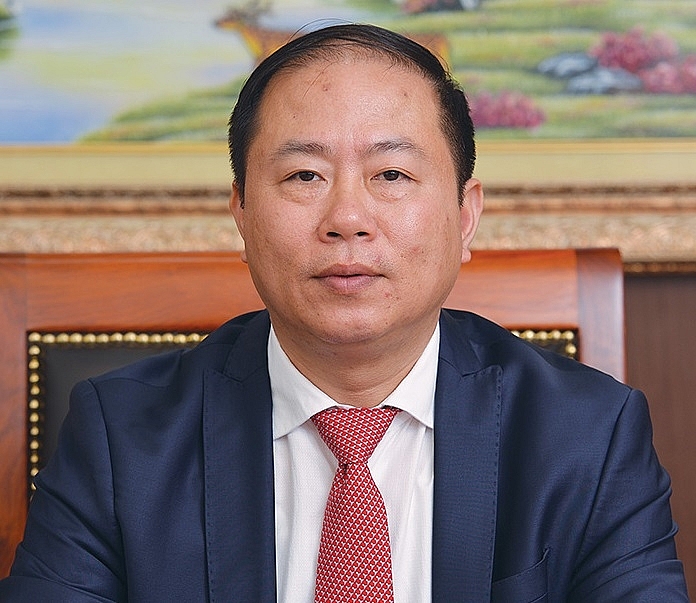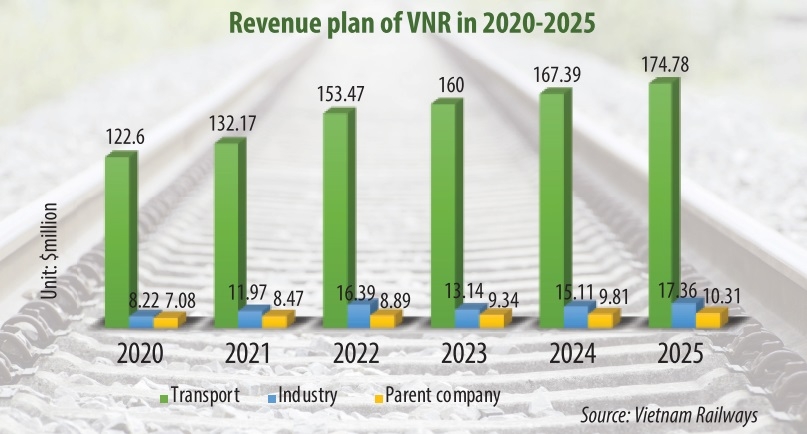Safety on the line for railway system in stagnation crisis
 |
| Vu Anh Minh, chairman of Vietnam Railways |
There are different ideas in Vietnam about how much state funding should be allocated for railway maintenance this year, which is causing difficulties for the industry as a whole. Has the government announced any solutions yet?
As expected, the deputy prime minister of Vietnam will host a meeting in early May to deal with this problem. We are pinning high hopes on this.
Each unit and organ has different ideas stemming from their own aspects of management. Former Deputy Prime Minister Trinh Dinh Dung has thus assigned the Ministry of Justice (MoJ) to appraise the proposals of the Ministry of Transport (MoT) and Vietnam Railways (VNR).
The MoJ is a government agency, which is responsible for legal development and enforcement, and check legal performance so we totally believe and respect for appraisal.
After working with the relevant ministries and agencies, the MoJ then reported back to the former DPM that based on the prevailing rules, especially the Law on Railway Transport 2017, and to ensure efficiency and transparency in the management, operation, and use of national railway infrastructure, the allocation of railway maintenance funding to VNR is reasonable.
The DPM then asked the MoT to take into account the opinions of the MoJ. The MoT has then sent the report to him. We are currently waiting for the next direction of the prime minister.
 |
While waiting for sturdy solutions on the matter, what have VNR and its member companies been doing in order to ease the hardship for labourers?
As we have not received the allocated state funding for maintenance since the beginning of this year, our labourers are facing extreme difficulties.
In recent months, many units in the railway industry here mortgaged some of the company’s and even their own assets to take out bank loans so they can advance a small amount of money for their workers.
However, by the end of April, most of them were unable to keep up payments due to their small charter capital. There are about 20 companies in the railway industry focusing on maintenance, traffic safety, and railway signals, with charter capital of about VND20 billion ($870,000) and 500-1,000 employees each.
What I am most concerned about however is railway safety. Currently, safety in the industry in Vietnam depends mostly on the individuals. When labourers’ lives are not ensured, the safety risks increase.
The railway industry now consists of a huge number of partners and customers. How will the stagnation of train operations impact them?
The apatite, cement, and petroleum industries as well as post are our biggest partners. Chemical businesses will be among the worst hit because they have some products which cannot be transported as effectively by other means. If the trains stop, they will simply have to choose other means of transport.
Railway also transports special items for the military, ensuring national security and defence. At the same time, Vietnam Railways is an important link for the Asia-Europe railway chain, and any stagnation will influence businesses operating along this line.
For the passenger transport segment, the industry now serves 36 cities and provinces.
State funding for railway maintenance only meets 30-40 per cent of the industry’s total demand, leading to many items waiting for their due upgrade for years, posing significant hazards.
| Nguyen Ngoc Dong - Deputy Minister of Transport The MoT’s point of view is reflected in the report sent to the prime minister on April 12. The MoT agrees with the Ministry of Finance in allocation of state funding for railway maintenance in line with the Law on State Budget. Railway companies should sign the contract with the Vietnam Railway Authority (VRA) to receive funding for their works. The VRA does not need too many people to manage the contracts with the member companies of VNR doing maintenance. The MoT has made the proposal to the prime minister, and we will do as decided by him. Nguyen Xuan Hoa - Former board chairman, Saigon Railway JSC In the past, delays in maintenance contracts infrequently happened. If so, the allocation of state funding would be completed by March, so railway companies were able to advance money to hold out until the signing date came. In 2021, the delay of the fund allocation lasts now more than four months, negatively affecting the 20 railway firms and putting thousands of workers into a miserable situation. Those companies and their workers all want to receive the state funding but they present different grounds for this, which has prevented the disbursement of the state funding. Strict punishments should be carried out on any unit that causes a further delay. Vu Quang Khoi - Director general, VRA The MoT and the VRA proposed a scheme under which the authority signs maintenance contracts with the 20 member companies of VNR. The authority also signs other contracts with VNR to supervise maintenance works as planned with the funding allocated by the MoT. Since the beginning of this year, the VRA has many times sent many documents to VNR, asking to intensify checks and direct its units to closely work with local authorities and take measures to ensure rail transport safety. As a state management agency, the VRA has set up many inspection and working groups on railway safety, especially for the North-South railway network where upgrades of the Hanoi-Vinh and Nha Trang-Ho Chi Minh City routes are being carried out. Duong Nhu Duc - Director, Ninh Binh Phosphate Fertiliser JSC We have been working with VNR for years. We hire it to transport phosphate fertiliser from the northern to the central and the southern regions. Annually, we transport over 10,000 tonnes of phosphate fertiliser on average by rail to the regions. We choose rail because of faster delivery, locations of railway stations suitable for our customers, and reasonable price. By-rail transportation of phosphate fertiliser makes up 40 per cent of the company’s total volume. The rest is carried by road and sea. If there is any stagnancy in operation of the railway industry, we will be strongly hit. The cost of by-sea transportation remains high, while by-road vehicles cannot meet the demand. |
What the stars mean:
★ Poor ★ ★ Promising ★★★ Good ★★★★ Very good ★★★★★ Exceptional
Related Contents
Latest News
More News
- VinaCapital launches Vietnam's first two strategic-beta ETFs (February 26, 2026 | 09:00)
- PM sets five key tasks to accelerate sci-tech development (February 26, 2026 | 08:00)
- PM outlines new tasks for healthcare sector (February 25, 2026 | 16:00)
- Citi report finds global trade transformed by tariffs and AI (February 25, 2026 | 10:49)
- Vietnam sets ambitious dairy growth targets (February 24, 2026 | 18:00)
- Vietnam, New Zealand seek level-up in ties (February 19, 2026 | 18:06)
- Untapped potential in relations with Indonesia (February 19, 2026 | 17:56)
- German strengths match Vietnamese aspirations (February 19, 2026 | 17:40)
- Vietnam’s pivotal year for advancing sustainability (February 19, 2026 | 08:44)
- Strengthening the core role of industry and trade (February 19, 2026 | 08:35)

 Tag:
Tag:




















 Mobile Version
Mobile Version